Your ultimate guide to carbon capture and storage technologies
August 11, 2022
- Home
- Blog

Source: Frame Stock Footage/Shutterstock
Direct air capture and storage of carbon is now costing up to USD$345 (per ton of CO2)
One of the most lauded solutions in combating the reduction of carbon dioxide in the atmosphere is carbon capture.
The concept is straightforward. Carbon capture and storage (CCS) aims to capture and store CO2 before it enters the atmosphere. The emissions occur during the burning of fossil fuels in industrial processes and power generation.
The transportation of CO2 is done by pipelines, ships, and even trucks. After that comes the storage phase in which the carbon dioxide is taken to deep saline formations, caves, and other locations several kilometers below the earth’s surface.
Different technologies and approaches are being developed to change the current high-risk scenario, that sees almost 415 parts per million of CO2 entering the atmosphere, with an increase of 2.5 ppm per year.
To fully grasp the potential of carbon capture, let’s start by unpacking the different forms of carbon capture solutions being practiced today.
What are the technologies for carbon capture?
 Source: Frame Stock Footage/Shutterstock
Source: Frame Stock Footage/Shutterstock
First, the three capturing methods
Based on the concepts of capture, transport, and storage, the implementation of CCS, can be done using one of the following three methods.
Post-combustion carbon capture
Captures the CO2 from exhaust gas, which is then absorbed by liquid solvents. Next, a chemical reaction occurs, where the CO2 is removed, giving rise to a new compound. This is the most used method for capturing carbon dioxide and can be divided into three techniques; biological, physical, and chemical.
Pre-combustion carbon capture
Captures CO2 before fossil fuels are burned. In the pre-combustion stage, hydrogen and carbon coexist (hydrocarbons) and, therefore, can be separated through chemical processes. Once this is done, CO2 is stored in underground geological formations, while hydrogen is used as fuel.
Oxy-fuel combustion systems
This is the least used method. However, it is also the most interesting due to its ability to remove almost 100% of carbon dioxide in the atmosphere. The concept that guides the method is simple; Instead of using air (oxygen fraction) in combustion, pure oxygen is used. Then, steam and CO2 are released by the exhaust; the former is easily condensed into the water, while the latter is stored.
The above three methods define the carbon dioxide capture process in industrial facilities. Now let us look at some of the major carbon capture technologies and approaches being used today to reduce CO2 emissions.
Major technologies and approaches
In 2020 the International Energy Agency calculated the global cost of technologies and approaches used to capture and store carbon dioxide.
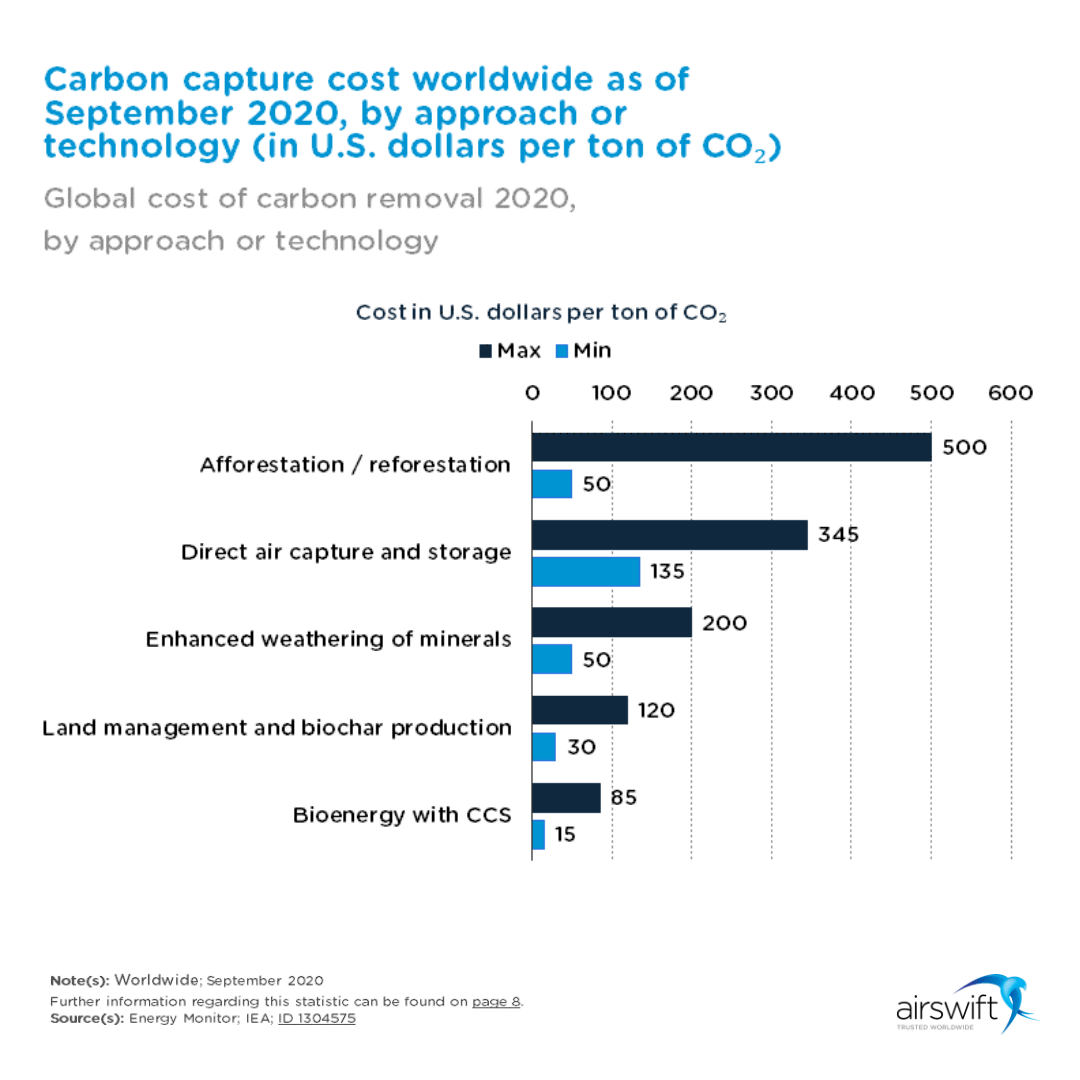
You will notice that there is no fixed figure to determine the cost of carbon capture technologies. All the data is summarised in ranges because numerous variables can impact the cost, such as a specific location, plant, and point in time.
Undoubtedly, there is already a large number of options that can reduce carbon emissions. But what are the advantages of each? See below for everything you need to know about these alternatives.
Afforestation/reforestation
As the name suggests, it is the practice of planting new forests in places lacking vegetation cover. Here, a natural carbon removal process (photosynthesis) occurs as the trees grow. This is a biological example of post-combustion carbon capture.
Direct air carbon capture and storage (DACCS)
As chemical solvents capture carbon dioxide directly from the air, significant energy inputs are required. So although it is more expensive than reforestation, it is more efficient. DACCS also does not have the challenge of land availability faced by reforestation. This one is the most promising carbon capture technology today.
Enhanced weathering
Rock weathering is a chemical process that causes CO2 to turn into stable minerals when it comes in contact with silicate and carbonate rocks. Using this approach, carbon dioxide can be stored and removed from the atmosphere. So, enhanced weathering of minerals accelerates this process, which can be done in several ways, such as injecting CO2 into subsoil rocks.
It is still a nascent technology, demanding a lot of research, but we can already see investments in some potential companies. The mining industry is one of the niches that can take advantage of this technology, as mine tailings can fulfill this CO2 storage function while helping to decarbonize the industry.
Land management and biochar production
In the absence of oxygen, the thermal decomposition of biomass (pyrolysis) produces charcoal known as biochar. From land management strategies, biochar can be buried in the soil, resulting in a biological carbon sequestration process. Today we see only small-scale operations of this technology.
Bioenergy with CCS
Through biomass converted into a renewable energy source (bioenergy), this negative emissions technology is the most scalable. It is still necessary to evaluate its counter-effects since this solution demands a lot of time and land.
What are the pros and cons of CCS?
Over-promising and under-delivering?
Carbon capture technologies are still the subject of much controversy. The costs today raise doubts about its efficiency in the long term because, after all, time is something we have less and less of when it comes to the climate crisis.
 Source: Frame Stock Footage/Shutterstock
Source: Frame Stock Footage/Shutterstock
A report released by Friends of the Earth Scotland and Global Witness (commissioned by Tyndall Center for Climate Change Research) addressed several pressing questions regarding the current outlook of CCS. Some of the facts worth addressing include:
- The number of CCS projects currently installed is much lower than previously anticipated.
- Global operational CCS capacity is equivalent to only 0.1% of fossil fuel’ss global emissions.
- About 81% of the captured carbon is used for oil extraction via Enhanced Oil Recovery (EOR).
In light of the questions raised, Friends of the Earth Scotland and Global Witness believe that CCS has been a distraction due to efforts that could be redirected to renewable energy.
Another critic of carbon capture technologies, researcher Mark Jacobson, from Stanford University, published an article in the Energy and Environmental Science journal explaining that such technologies are insufficient to justify the economic and social (air pollution increasing) costs. He is one of those who advocates that these investments should focus on solar or wind energy.
A bridging solution
There is little need to reiterate the main advantage of investing in carbon capture technologies: the decarbonisation of the atmosphere.
Fossil fues will not disappear overnight no matter how much we encourage their replacement with clean energy. That is why every tool in the toolbox of energy transition has a vital role to play.
These negative emission technologies can manage large amounts of CO2 across several different industrial sources (power, oil, steel, cement and others), showing their diverse acting potential.
Also, CSS has the appeal of being able to combine organic matter (biomass) or geothermal energy production in its operation.
Furthermore, one of the most significant advantages of using carbon capture technologies is the motivation to use fossil fuels more responsibly.
As the carbon credit market grows, these technology encouragements will prosper. As professor Howard Herzog, from the MIT Energy Initiative, has already analysed, such incentives to tax coal-fired power plants by CO2 emissions will inevitably promote investments in more technologies capable of capturing 100% of carbon dioxide in the atmosphere.
The job creation scenario can also benefit from this, as these technologies will inadvertently lead to an increase in demand more engineers and new specialists, leading to an emergence of unique career pathways for CCS technology.
So, Is CCS cost-effective?
At this point in the article, you can already predict that the answer to this question is not so simple. As a nascent technology, CCS is still regarded with a mix of skepticism and hope.
While its high costs might turn heads, market trends and future forecasts show a healthy interest in pursuing this technology.
Carbon capture technologies can be costly, but, according to Wood and Mackenzie, forecasts for the coming years are encouraging. The global consultancy film predicts a price reduction of around 20% by 2050.
And investments in the area show confidence in the evolution of this technology. Between 2018 and 2020, funding for carbon capture technologies jumped from nearly USD$ 1 million to USD$ 2.8 billion in Europe, the Middle East, and Asia.
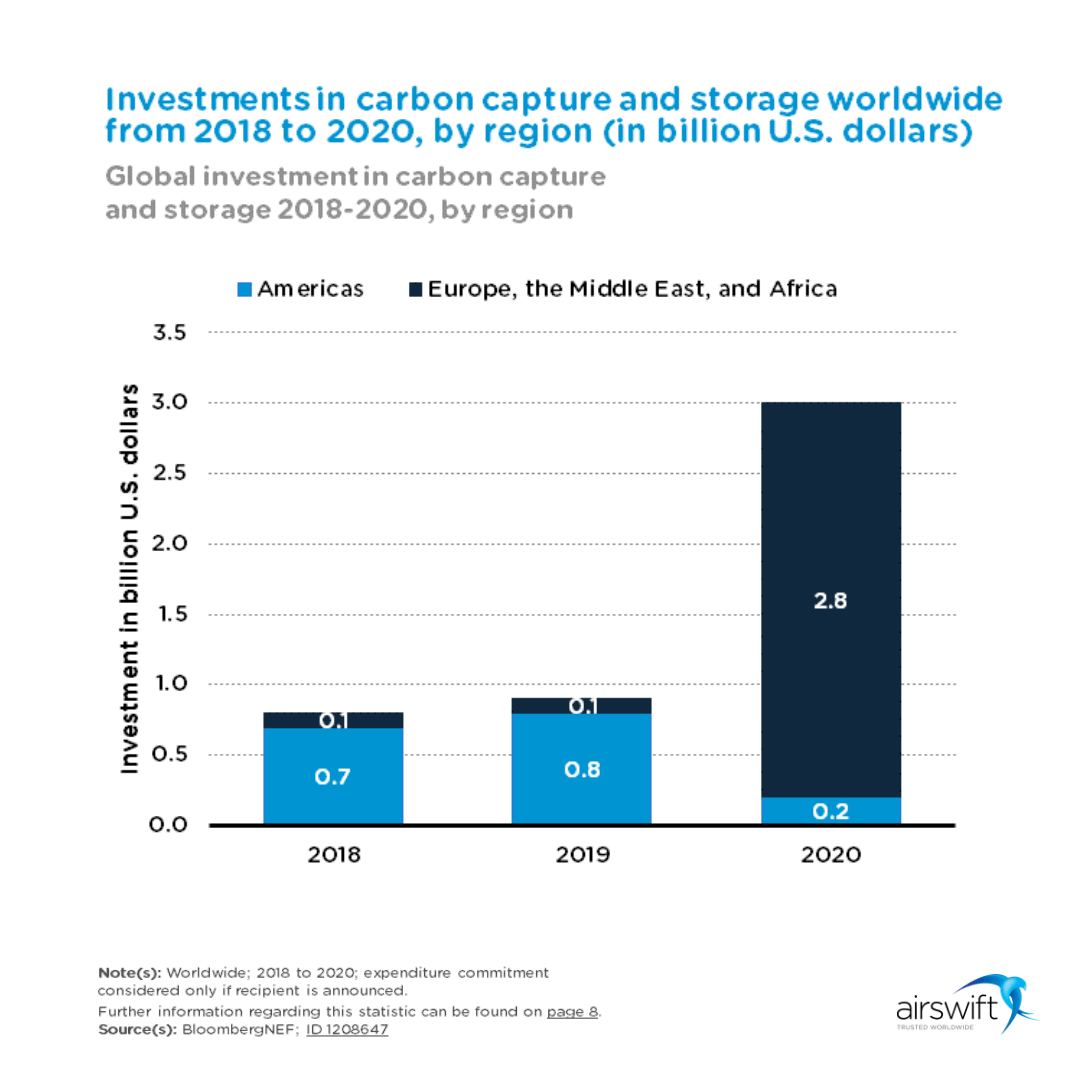
And as for forecasts for the following years, USD$30 billion is expected to be invested in CCS in Europe alone until 2030. And the US is expected to become a leader in financing carbon capture technologies.
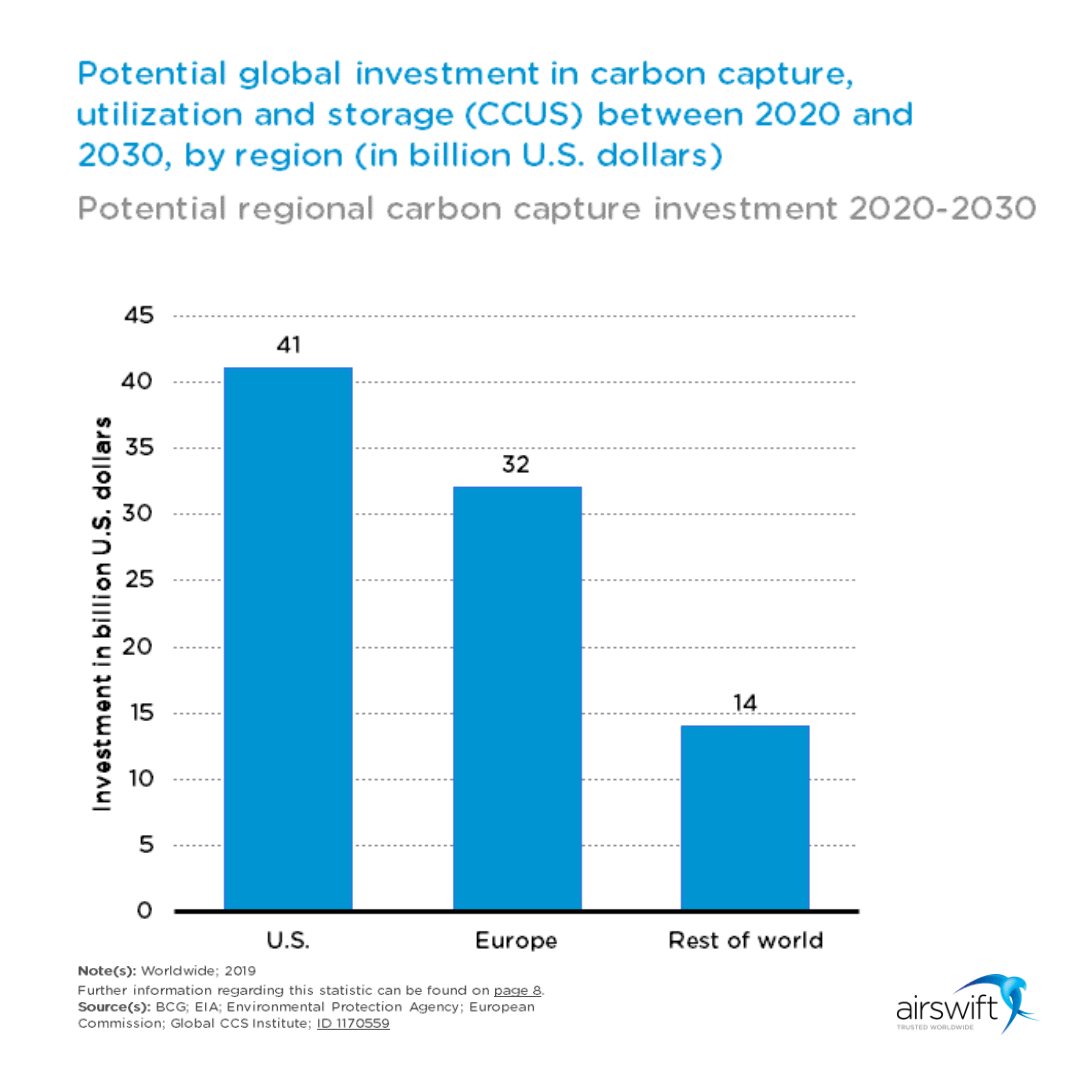
There is still much to unravel surrounding the potential of carbon capture technologies. Uncertainties exist, and we can have a sample of this in the variation of the percentage of CO2 removal pointed out by scientists in the Climate Change and Land report.
The information is part of the graph showing predictions as to the conceivable removal power of land-based carbon capture technologies.
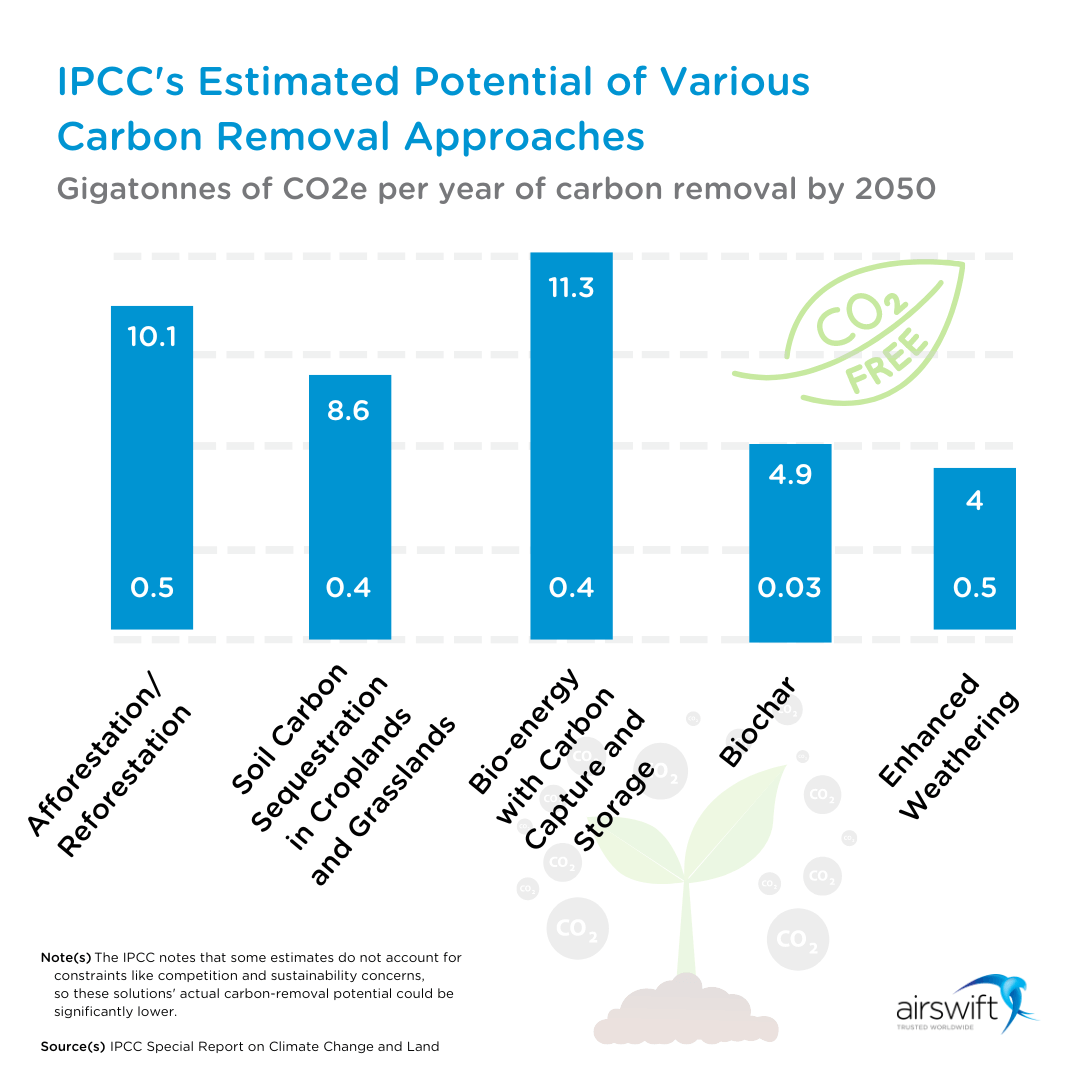
The top of the range for afforestation/reforestation (10.1 GtCO2-eq) is equivalent to China's carbon emissions in 2010, which shows how CCS can play a crucial role in our quest to net-zero by 2050.
Companies and Clusters
Trending Companies
These are companies that are playing a transformative role in the energy industry with their carbon capture solutions.
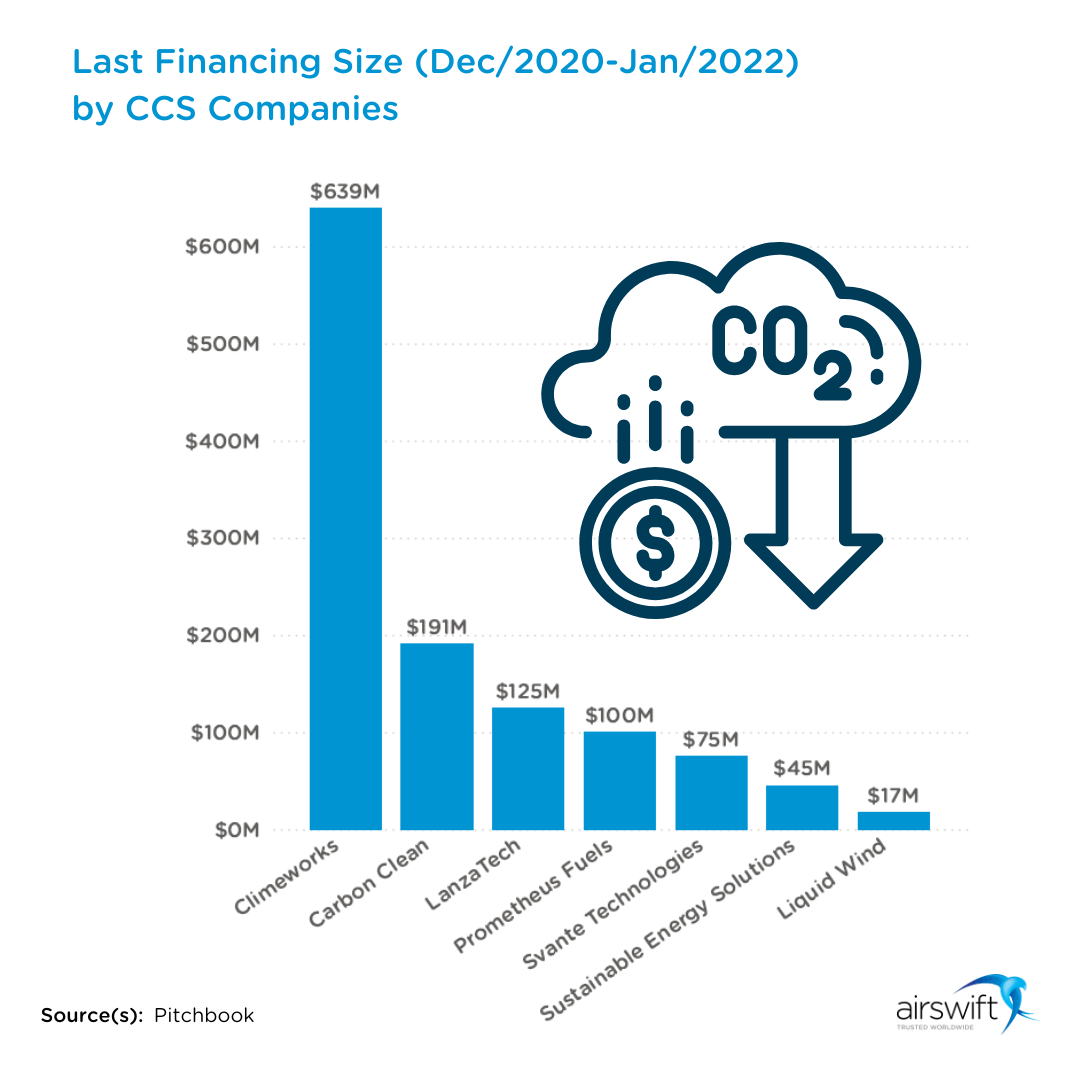
Clusters
CCS Innovative Zone in Houston
Clusters are areas with companies sharing efforts in carbon transport and storage. They can be seen as fundamental initiatives to increase the efficiency of carbon capture technologies and reduce their costs.
In the US, ExxonMobil announced, in 2020, the creation of what could become the largest CCS cluster in the world. The project called CCS Innovative Zone will be installed in Houston.
So far, the cluster already has the adhesion of 14 companies to be financed; among them are names like Shell and Chevron. The project was estimated at USD 100 billion, but this amount is expected to vary depending on the total amount of government-funded subsidies.
European Clusters
In its 2021 report, the International Energy Agency identified European clusters with potential for development in carbon capture technologies.
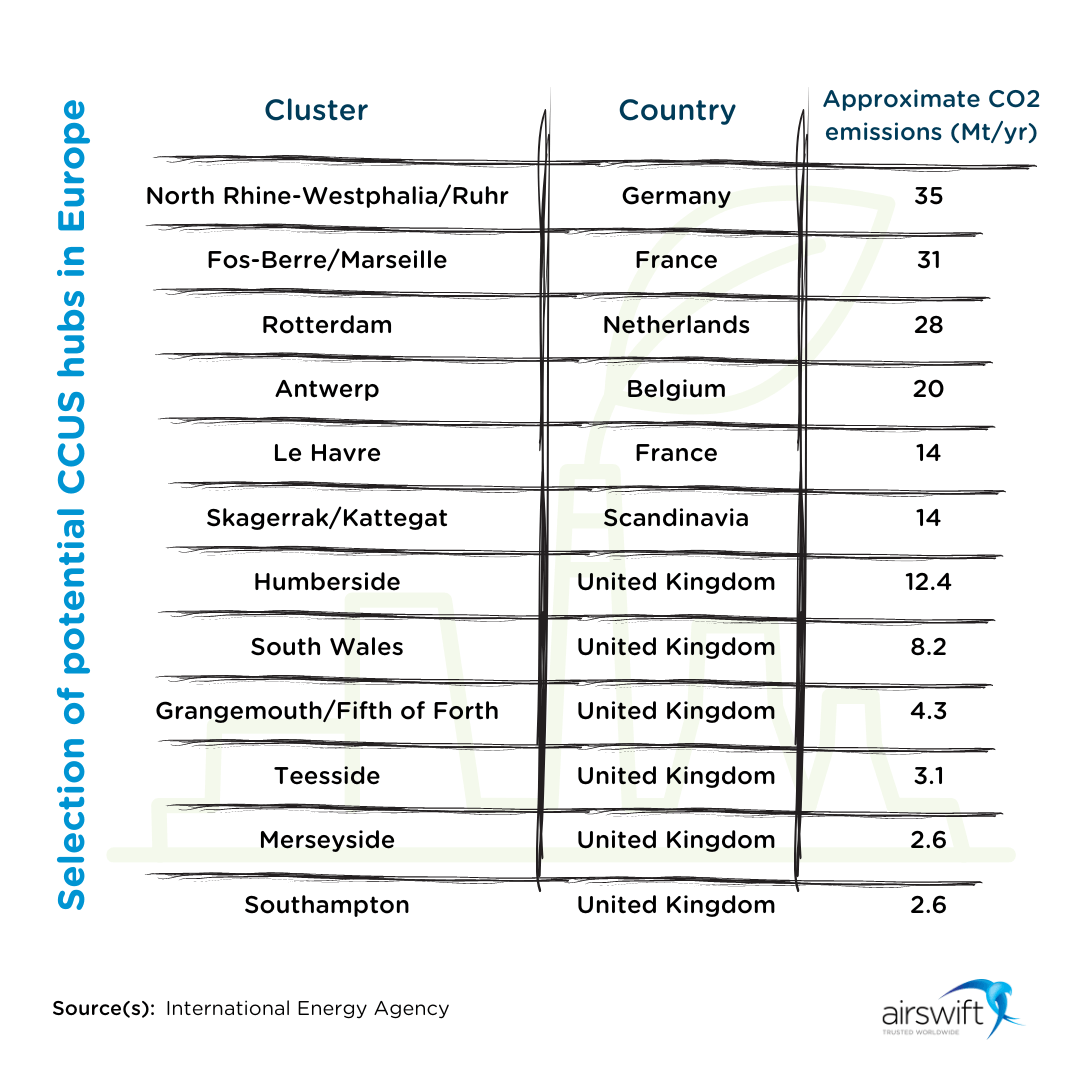
The United Kingdom has some of the most prominent initiatives in the area of negative emission technologies. A good example is the CCS Infrastructure Fund announced by the UK government for at least USD 1 billion. The prediction is to invest in four industrial clusters by 2030, targeting the capture and storage of 20-30 MtCO2 per year.
Want to become part of an innovative cluster? We can help you!
Many technologies are emerging, and with that, new opportunities are created in different regions. The most exciting thing is that there is room for different technological solutions in this energy transition, so it does not make sense to talk about a silver bullet.
All organisations thinking of expanding and entering the main clusters of these nascent technologies, need to know that a workforce solutions partnership is essential.
That's where Airswift comes in. We are a company with years of experience in the outsourcing market, with more than 9,000 contractors and over 60 offices worldwide.
Want more insight into talent trends in the technology industry? Click the link below to download our latest whitepaper.

This post was written by: Raphael Santos, Content Marketing Coordinator
You may also be interested in…
-
VCs have spoken: the 10 US states dominating venture capital in 2021
-
Solar focus: why Concentrated Solar Power is the next big thing
-
Top energy storage solutions and projects in Canada
-
Three US solar energy projects, jobs in demand, and top training programs
-
Refining the US petrochemical talent pipeline
-
Should energy companies prioritise tech and AI over training and development?
-
How to improve talent retention in a post-COVID world
-
This is why Cleantech 2.0 technologies are more promising
-
The next Silicon Valley? Emerging US tech hubs disrupting the industry
-
Deep-sea mining technology: the potential job market and challenges



